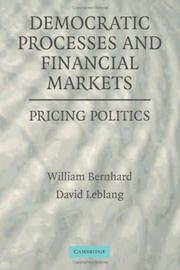| Listing 1 - 2 of 2 |
Sort by
|

ISBN: 9780511607226 9780521861229 9780521678384 9780511282126 0511282125 0511607229 0521861225 0521678382 1139810545 0511280947 0511281366 1299318681 0511281749 Year: 2006 Publisher: New York : Cambridge University Press,
Abstract | Keywords | Export | Availability | Bookmark
 Loading...
Loading...Choose an application
- Reference Manager
- EndNote
- RefWorks (Direct export to RefWorks)
The authors examine the conditions under which democratic events, including elections, cabinet formations, and government dissolutions, affect asset markets. Where these events have less predictable outcomes, market returns are depressed and volatility increases. In contrast, where market actors can forecast the result, returns do not exhibit any unusual behavior. Further, political expectations condition how markets respond to the political process. When news causes market actors to update their political beliefs, market actors reallocate their portfolios, and overall market behavior changes. To measure political information, Professors Bernhard and Leblang employ sophisticated models of the political process. They draw on a variety of models of market behavior, including the efficient markets hypothesis, capital asset pricing model, and arbitrage pricing theory, to trace the impact of political events on currency, stock, and bond markets. The analysis will appeal to academics, graduate students, and advanced undergraduates across political science, economics, and finance.
Capital market --- International economic relations. --- Economics --- Economic theory --- Political economy --- Social sciences --- Economic man --- Economic policy, Foreign --- Economic relations, Foreign --- Economics, International --- Foreign economic policy --- Foreign economic relations --- Interdependence of nations --- International economic policy --- International economics --- New international economic order --- Economic policy --- International relations --- Economic sanctions --- Capital markets --- Market, Capital --- Finance --- Financial institutions --- Loans --- Money market --- Securities --- Crowding out (Economics) --- Efficient market theory --- Political aspects. --- Social Sciences --- Political Science
Book
ISBN: 1009233254 1009233238 1009233246 100923322X 9781009233224 Year: 2023 Publisher: Cambridge ; New York, NY : Cambridge University Press,
Abstract | Keywords | Export | Availability | Bookmark
 Loading...
Loading...Choose an application
- Reference Manager
- EndNote
- RefWorks (Direct export to RefWorks)
Migration is among the central domestic and global political issues of today. Yet the causes and consequences - and the relationship between migration and global markets - are poorly understood. Migration is both costly and risky, so why do people decide to migrate? What are the political, social, economic, and environmental factors that cause people to leave their homes and seek a better life elsewhere? Leblang and Helms argue that political factors - the ability to participate in the political life of a destination - are as important as economic and social factors. Most migrants don't cut ties with their homeland but continue to be engaged, both economically and politically. Migrants continue to serve as a conduit for information, helping drive investment to their homelands. The authors combine theory with a wealth of micro and macro evidence to demonstrate that migration isn't static, after all, but continuously fluid.
Emigration and immigration --- Globalization. --- Economic aspects. --- Global cities --- Globalisation --- Internationalization --- International relations --- Anti-globalization movement
| Listing 1 - 2 of 2 |
Sort by
|

 Search
Search Feedback
Feedback About UniCat
About UniCat  Help
Help News
News